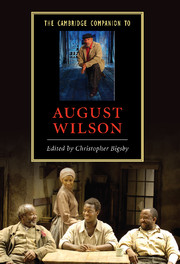Book contents
- Frontmatter
- 1 August Wilson: the ground on which he stood
- 2 Been here and gone
- 3 August Wilson’s relationship to black theatre: community, aesthetics, history and race
- 4 Music and mythology in August Wilson’s plays
- 5 Gem of the Ocean and the redemptive power of history
- 6 Joe Turner’s Come and Gone
- 7 Ma Rainey’s Black Bottom: cutting the historical record, dramatizing a blues CD
- 8 A piano and its history: family and transcending family
- 9 The tragedy of Seven Guitars
- 10 Safe at home?: August Wilson’s Fences
- 11 Two Trains Running: blood on the tracks
- 12 Jitney, folklore and responsibility
- 13 King Hedley II: in the midst of all this death
- 14 Radio Golf: the courage of his convictions - survival, success and spirituality
- 15 Critics on August Wilson
- 16 An interview with August Wilson
- Index
1 - August Wilson: the ground on which he stood
Published online by Cambridge University Press: 28 January 2008
- Frontmatter
- 1 August Wilson: the ground on which he stood
- 2 Been here and gone
- 3 August Wilson’s relationship to black theatre: community, aesthetics, history and race
- 4 Music and mythology in August Wilson’s plays
- 5 Gem of the Ocean and the redemptive power of history
- 6 Joe Turner’s Come and Gone
- 7 Ma Rainey’s Black Bottom: cutting the historical record, dramatizing a blues CD
- 8 A piano and its history: family and transcending family
- 9 The tragedy of Seven Guitars
- 10 Safe at home?: August Wilson’s Fences
- 11 Two Trains Running: blood on the tracks
- 12 Jitney, folklore and responsibility
- 13 King Hedley II: in the midst of all this death
- 14 Radio Golf: the courage of his convictions - survival, success and spirituality
- 15 Critics on August Wilson
- 16 An interview with August Wilson
- Index
Summary
I am one of those warrior spirits. The battle since the first African set foot on the continent of North America has been a battle for the affirmation of the value and worth of one's being in the face of this society that says you're worthless
. . . As Africans prior to coming over here, they existed, and they were the center. Everything revolved around them in their world view. Over here, all of that has been taken and stripped away. So I say, 'Let's look at it. The world is right here in this back yard.' There is no idea that cannot be contained by black life. We have the entire world here . . . it all depends on where you're standing . . . I'm standing over here.
August WilsonOn 2 October 2005 August Wilson died at the Swedish Medical Centre in Seattle. It was just eight months after the death of another American playwright, Arthur Miller. They came out of different worlds. Miller was descended from immigrants on both sides of the family, Jews who went to America to escape persecution and seek their fortune. And if they subsequently lost the fortune they made, they nonetheless never lost belief in the system that had redeemed them from a far worse fate. To be sure, they encountered prejudice, but even so they slid with some ease into an America which swiftly bore the impress of European Jews as they emerged as entrepreneurs, artists, scientists and intellectuals surprisingly ready to interpret America to itself.
For some, particularly those in middle age at the moment of immigration, the maintenance of the old ways was a priority. For others, the trading of a previous identity was a small price to be paid for the acquisition of a new one. If Jewishness was perceived as a problem, it could be wished away, literally or symbolically. Names could be changed. Miller abandoned his grandparents' god, and though he continued to write works in which Jewish characters were confronted with the implications of their identities, this was not his subject.
- Type
- Chapter
- Information
- The Cambridge Companion to August Wilson , pp. 1 - 27Publisher: Cambridge University PressPrint publication year: 2007

